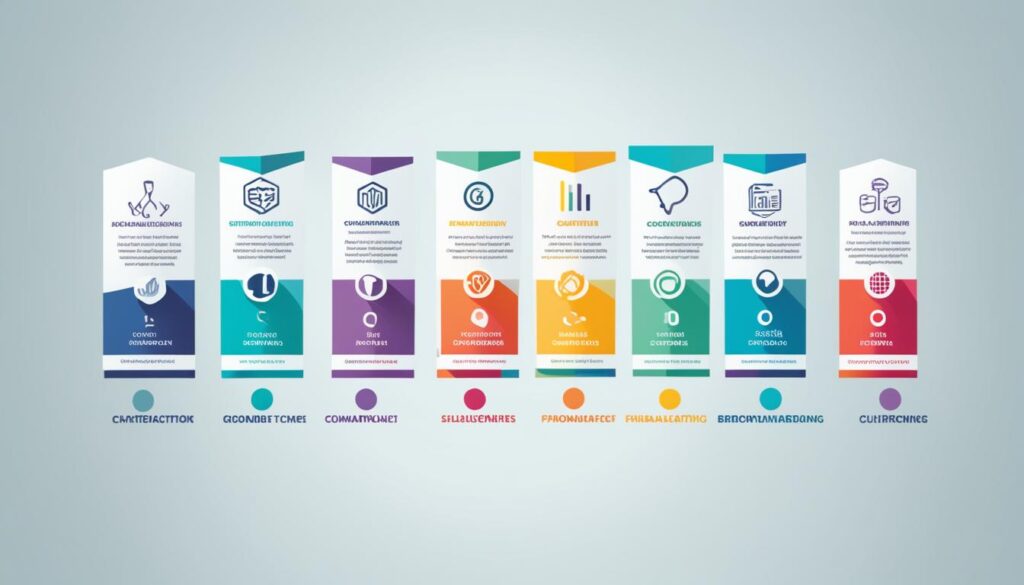Building a personal brand is essential today. Your brand showcases your unique professional strengths. It authentically highlights your exceptional skills and values. Personal branding strategically presents you to the world.
Personal branding crafts a narrative about you. It encapsulates who you are and your passions. Your brand is often the first professional impression. This includes your LinkedIn, website, and social media.
With technological advancements like AI and automation, crafting a compelling identity is crucial. Your brand must stand out for future success.
Key Takeaways:
- Personal branding is vital for professional success today
- Your brand should showcase your unique skills authentically
- Crafting a narrative about yourself is key
- Social media shapes how you’re perceived professionally
- Adapting your brand for technological changes is essential
The Evolution and Importance of Personal Branding
Personal branding has greatly changed over time. It’s no longer just for celebrities. In today’s digital world, your personal brand is like a digital handshake. It’s often the first impression others have of you.
The rise of blogs, social media, influencer marketing, podcasts and video content shaped personal branding. As technology advances with wearables, nanotechnology, quantum computing and 5G networks, personal branding grows more important.
From Celebrity to Necessity: The Changing Landscape of Personal Branding
Personal branding isn’t just for the famous anymore. It’s a must for everyone – business owners, job seekers, and more. In a crowded market, a strong personal brand helps you stand out. It can advance your career, build industry credibility, or attract new clients.
| Traditional Personal Branding | Modern Personal Branding |
|---|---|
| Primarily associated with celebrities and public figures | Essential for professionals across various industries |
| Limited to offline interactions and traditional media | Heavily reliant on online presence and digital platforms |
| Focus on self-promotion and image management | Emphasis on authenticity, value creation, and engagement |
| Static and slow-evolving | Dynamic and rapidly adapting to technological advancements |
The Digital Handshake: First Impressions in the Online Era
Nowadays, your online presence often comes before meeting in person. Your digital footprint – social media, website, portfolio – acts as a digital handshake. It introduces you to potential employers, clients and collaborators.
Mastering your online presence impacts career advancement and networking. Professionals leveraging digital platforms to showcase expertise, share content and engage stand out. They attract connectors and employers.
Your personal brand is what people say about you when you’re not in the room. – Jeff Bezos, Founder of Amazon
As personal branding evolves digitally, embracing new tech and strategies is key. Consistently communicating your unique value builds a powerful brand. This opens doors and sets you apart.
The Essence of Personal Branding: Defining Your Unique Value
Personal branding communicates your unique value. It involves deep understanding of identity. Use this knowledge to strategically position yourself. Over 90% actively manage personal brands for career success. It’s vital in today’s competitive job market.
Building a strong personal brand enhances networking capabilities. It drives career advancement and establishes competitive advantage. A well-defined brand demonstrates commitment to growth. It enhances credibility in interviews and networking. Highlight specific skills, expertise, strengths to stand out.
Breaking Down the Basics: Understanding Personal Brands
Personal branding involves consistent messaging across platforms. Establish strong brand by defining values, identifying audience. Brand yourself effectively, network actively, seek peer feedback. Consistency in messaging and storytelling are crucial.
Personal vs. Corporate Branding: Key Differences
| Personal Branding | Corporate Branding |
|---|---|
| Focuses on an individual’s identity, values, and unique qualities | Revolves around a company’s identity, values, and promise to customers |
| More flexible and can evolve with career and personal growth | Typically remains consistent to maintain business credibility and reputation |
| Emphasizes individual skills, expertise, and strengths | Focuses on company-wide capabilities, products, and services |
| Builds personal connections and trust with target audience | Establishes brand loyalty and customer relationships |
Personal branding focuses on individual identity, qualities. Corporate branding revolves around company identity, customer promises. Personal branding evolves; corporate branding remains consistent.
Building personal brand online is crucial today. It offers platform to display skills, expertise globally. Personal branding fosters networking, career advancement. Stay abreast of trends, emerging tech to remain relevant.
Core Elements of Personal Branding: The 4 C’s
In the professional world, four key elements form the pillars of a strong personal brand. These are clarity, consistency, content, and charisma. By mastering these aspects, individuals can craft a memorable identity that resonates with their audience.
Clarity means being authentic and transparent about who you are and your unique value. Clearly communicating your skills, experiences, and passions builds trust with your audience.
Consistency ensures your messaging and visuals remain cohesive across platforms. A unified theme reinforces brand recognition.
Clarity: Transparency in Your Brand Identity
Clarity involves deeply understanding your strengths and communicating them authentically. Transparent about your skills and passions, you build credibility with your audience.
Clearly defining your unique value proposition allows you to stand out. Audiences trust a transparent brand identity.
Consistency: Maintaining a Unified Theme
Consistency means maintaining a cohesive message and visual identity across platforms. Your brand should be recognizable and memorable.
Whether on social media, networking events, or collaborations, a unified theme reinforces your brand. Consistency builds recognition.
Content: Creating Relevant and Valuable Material
Content showcases your expertise, insights, and personality. Relevant and valuable material resonates with your target audience.
Through blogs, podcasts, or social media, share your unique perspective. Provide genuine value to establish thought leadership.
Charisma: Infusing Personality into Your Brand
Charisma makes your brand stand out and connect on a deeper level. Infuse your personality, humor, and storytelling abilities.
Showcasing charisma through content and interactions creates a memorable, likable brand. Attract opportunities and build lasting relationships.
| Element | Key Aspects | Benefits |
|---|---|---|
| Clarity | Transparency, authenticity, unique value proposition | Builds trust and credibility with audience |
| Consistency | Unified messaging, cohesive visual identity | Reinforces brand recognition and memorability |
| Content | Relevant, valuable, showcases expertise and insights | Establishes thought leadership and provides genuine value |
| Charisma | Personality, humor, storytelling abilities | Creates a memorable and likable brand that attracts opportunities |
Mastering clarity, consistency, content, and charisma crafts a compelling personal brand. As technologies reshape the professional landscape, a strong brand becomes invaluable for navigating the future of work.
The 7 Pillars of Personal Branding Explained
Personal branding involves crafting a unique professional identity. By focusing on seven pillars, you can build a strong, authentic personal brand.

The first pillar is Authenticity. Stay true to yourself and present a genuine image. Understand your qualities, values, and strengths.
Visibility is the second pillar. Manage your online presence across social media, websites, and digital channels. Engage, create content, and build relationships.
“Your personal brand is what people say about you when you are not in the room.” – Jeff Bezos, Amazon Founder
The third pillar is Networking. Build professional relationships to expand your influence and gain insights. Attend events, join organizations, and engage online.
Value Proposition is the fourth pillar. Articulate your unique skills, experiences, and expertise. Tailor your value proposition to your target audience.
Audience Understanding, the fifth pillar, involves knowing your target audience. Create personas, analyze competitors, and develop a content strategy that resonates.
Reputation Management, the sixth pillar, is about mindfulness of how others perceive you. Monitor and manage your online reputation by delivering quality work.
The seventh pillar, Legacy, considers your long-term impact. Reflect on how you want to be remembered and make efforts to build a positive reputation.
Focus on these pillars to create a strong foundation. Personal branding requires consistent effort and adaptation as you grow professionally.
Crafting Your Brand: A Step-by-Step Guide
Creating your personal brand needs planning and self-reflection. As work evolves with tech like the internet of things, blockchain, augmented reality, and virtual reality changing industries, it’s key to know your unique talents. Clearly define goals to shape your branding plan.
Recognize Your Unique Strengths and Goals
A powerful personal brand understands what makes you special. Reflect on your skills, interests, and ambitions. Studies show:
- 89% of learning experts agree building employee skills helps navigate the changing workforce.
- Harvard says 75% of executives credit mentors for career advancement.
- For companies, reskilling staff often pays off, per McKinsey.
Learning, skill growth, and mentorship shape your unique value. Pinpoint talents and experiences setting you apart in your field. Align them with objectives.
Self-Reflection: Assess Talents, Passions, Aspirations
Dig deeper into self-reflection to reveal core strengths, true passions, and long-term goals. Consider these steps:
- Self-assess to identify top skills and expertise areas.
- Reflect on fulfilling, satisfying projects and experiences.
- Envision your ideal career path and industry impact.
This introspection clarifies unique attributes forming your personal brand’s foundation.
Define Objectives: Shape Your Branding Plan
With clarity on unique attributes, define personal branding objectives. Data shows:
| Objective | Importance |
|---|---|
| Career Growth | Showcase skills/expertise for new opportunities and advancement. |
| Thought Leadership | Establish authority sharing valuable insights in your field. |
| Networking | Build meaningful professional connections for collaboration. |
Aligning your strategy with objectives creates an impactful way to showcase unique value digitally.
“Your personal brand is a promise to your clients… a promise of quality, consistency, competency, and reliability.” – Jason Hartman
As you build your personal brand, keep this promise front and center. Ensure every aspect authentically reflects your value to your audience.
Telling Your Story: The Power of Authenticity
In personal branding, authenticity is key. Crafting a relatable brand involves more than listing achievements and skills; it’s about weaving a compelling narrative. Authentic storytelling showcases your expertise, values, and unique experiences, creating genuine connections.
Consider an executive who spent over 40 years working in a factory before becoming a leader. By dedicating an hour each day to learning every employee’s name, this leader demonstrated commitment to building authentic relationships. This story showcases their values and how consistent messaging shapes a strong personal brand.
Authentic storytelling can transform team dynamics and collaboration. Research shows stories guide behavior more effectively than rational thinking alone. Encouraging employees to share personal stories fosters deeper understanding and teamwork. Knowing team members’ stories proved invaluable in developing a successful crowdfunding campaign communication strategy.
Transformational change requires dropping one’s armor and embracing authenticity in the workplace. Authentic storytelling plays a significant role in achieving transformational, systems change.
Authentic storytelling impacts beyond the individual level. When leaders share personal stories, they inspire, persuade, inform, and create buy-in. Vulnerability is crucial for courageous leadership and effective workplace storytelling.
As personal branding intersects with emerging technologies like 3D printing, autonomous vehicles, and smart cities, infusing your brand with stories showcasing adaptability and expertise navigating these advancements positions you as a leader.
| Statistic | Value | Significance |
|---|---|---|
| Percentage of people who respond with their own stories when someone shares theirs | 100% | Demonstrates the power of storytelling in building connections and encouraging others to share their experiences |
| Percentage of people who feel happier when they are heard, seen, and understood | Higher likelihood | Highlights the importance of creating a work environment where personal stories are welcome, leading to increased happiness, productivity, and collaboration |
In conclusion, authentic storytelling is powerful for personal branding. By sharing real-life examples showcasing your skills, values, and experiences, you create a relatable, memorable brand resonating with your audience. Embrace authenticity, and let your unique story shine.
Digital Footprint and Online Presence
Our digital footprint shapes our reputation. What we post matters. Be mindful of online activities.

Update social media regularly. Engage with others. Contribute valuable content. Use platforms like LinkedIn, Twitter (X), and personal websites.
Each platform requires tailored approach. Maximize personal branding impact.
Leveraging Social Media and Digital Platforms
Social media powerfully brands you. LinkedIn highlights professionalism. Instagram and TikTok enable visual creativity.
But beware social media pitfalls. 70% companies screen applicants online. 18% lost jobs due to posts.
- Drug, alcohol posts deter hiring.
- Explicit language discourages employers.
- Reckless behavior impacts job chances.
Discouraged activities include:
- Complaining about past employers
- Sexual topic discussions
- Political debates
- Poor grammar, spelling
54% employers didn’t hire due to social media content:
| Reason | Description |
|---|---|
| Inappropriate material | Offensive, explicit posts |
| Alcohol, drug posts | Substance abuse promotion |
| Discriminatory comments | Bias against groups |
| Lying about qualifications | Misrepresenting skills, experience |
| Poor communication | Bad grammar, unprofessional language |
Tailoring Your Approach: Platform-Specific Strategies
Tailor approach per platform. Understand audience, features, best practices. Ensure brand consistency across touchpoints.
Zero online presence raises red flags. Employers seek professional presence, qualification evidence.
To manage digital reputation:
- Remove inappropriate content
- Delete outdated accounts
- Use unique passwords, manage cookies
- Google yourself, audit risky content
Proactively manage digital footprint. Keep personal brand authentic, compelling, goal-aligned.
Personal Branding for the Future of Work
Technological advancements and digital disruption transform the professional landscape. Personal branding is critical for navigating the future of work. The rise of automation, AI, and cutting-edge technologies reshapes industries, redefining job roles. Professionals must showcase their unique value proposition.
Adapting to the Changing Professional Landscape
Job security is no longer guaranteed. Professionals must develop skills and build a strong personal brand. The future demands agility, resilience, and proactive career management. Embracing lifelong learning and staying updated is crucial.
Studies show professionals will change jobs and careers more frequently. Personal branding differentiates individuals in a crowded marketplace. A compelling brand opens opportunities, increases income potential, and amplifies impact.
Embracing Technology and Digital Transformation
To thrive, professionals must embrace technology in personal branding. Proficiency in relevant tools like IoT, blockchain, AR/VR, 3D printing, and cloud robotics sets individuals apart. Showcasing innovative projects using cutting-edge solutions enhances personal brands.
Staying ahead of the curve and actively participating in digital transformation positions professionals as thought leaders and valuable assets.
Showcasing Your Value in the Age of Automation and AI
As automation and AI permeate the workplace, articulating one’s unique value proposition is crucial. While tasks may automate, human touch, creative problem-solving, and emotional intelligence remain irreplaceable.
Personal branding involves highlighting soft skills like communication, collaboration, and leadership alongside technical expertise. Demonstrating effective collaboration with AI and automation while bringing innovative thinking sets individuals apart.
| Personal Branding Evolution | Key Characteristics |
|---|---|
| Personal Branding 1.0 | Primarily embraced by senior executives in the business world |
| Personal Branding 2.0 | LinkedIn’s launch in 2003 empowered career-minded professionals to take charge of their careers |
| Personal Branding 3.0 | Emphasis on clarity, consistency, constant visibility, and delivering value in the digital age |
As the future unfolds, personal branding will evolve and adapt. By embracing technological advancements, digital transformation, and consistently showcasing unique value, professionals can build strong personal brands for success.
Conclusion
Rapid technological advances like the internet of things, blockchain, augmented reality, virtual reality, 3D printing, autonomous vehicles, smart cities, wearable technology, nanotechnology, quantum computing, 5G networks, edge computing, biometrics, voice assistants, predictive analytics, cloud robotics, digital twins, smart factories, intelligent automation, cognitive computing, and immersive technologies shape the future of work. Crafting a compelling professional identity stands you out in an increasingly competitive job market and positions you for career success.
Companies like David Bridal, JBS USA Holdings Inc., Levi Strauss & Co., Target Corp., Walmart Inc., and Amazon.com Inc. adapt by offering unique perks and benefits to attract and retain skilled talent. Deloitte analysts suggest focusing on four workplace shifts: transitioning from jobs to skills, expanding from employees to workforce ecosystems, moving from flex work to flex everything, and shifting from prediction to rapid experimentation.
The future workforce will be more diverse, flexible, and technologically savvy. By 2042, robots and artificial intelligence may significantly impact job functions, with contractors potentially making up 30% of the total workforce within five years. To navigate successfully, embrace continuous learning, adaptability, and personal branding power. Stay true to your unique skills, experiences, and values while consistently communicating your worth to create an enduring personal brand propelling you forward.
FAQ
What is personal branding, and why is it important?
Personal branding highlights your unique skills and values. It helps you stand out and build a strong reputation. In today’s competitive world, it opens doors to opportunities.
How has personal branding evolved over the years?
Personal branding is no longer just for celebrities. In our digital age, it’s crucial for everyone. Your personal brand serves as a digital first impression.
What’s the difference between personal branding and corporate branding?
Personal branding focuses on your individual identity and growth. Corporate branding revolves around a company’s consistent identity. Personal brands can evolve with your career path.
What are the core elements of personal branding?
The 4 C’s are Clarity, Consistency, Content, and Charisma. Be transparent about who you are. Maintain a unified theme across platforms. Create valuable, relatable content infused with your personality.
How can I craft my personal brand?
Identify your unique strengths, passions, and aspirations. Define your goals to shape your strategy. Authentically showcase your skills and values through storytelling.
Ensure consistency across online and offline platforms.
What role does storytelling play in personal branding?
Authentic storytelling makes your brand relatable and memorable. Share real-life examples showcasing your expertise and values. Maintain consistency in your message and tone.
How important is my online presence for personal branding?
Your online presence significantly impacts your personal brand. Regularly update social media and engage with your audience. Contribute valuable content to effectively manage your digital footprint.
How can I adapt my personal brand for the future of work?
Showcase your value and adaptability in a changing landscape. Demonstrate proficiency with relevant tools and platforms. Highlight projects showcasing innovation and problem-solving skills.
Reflect your commitment to continuous learning and growth.



